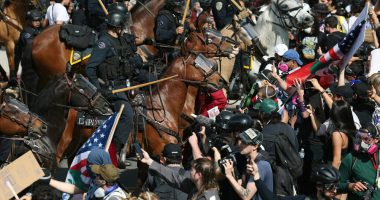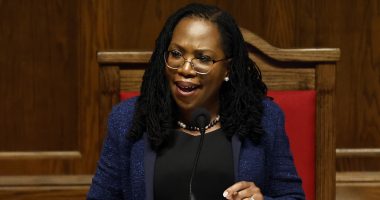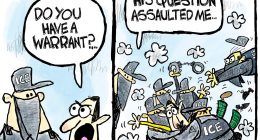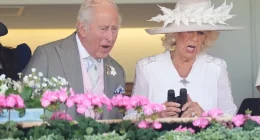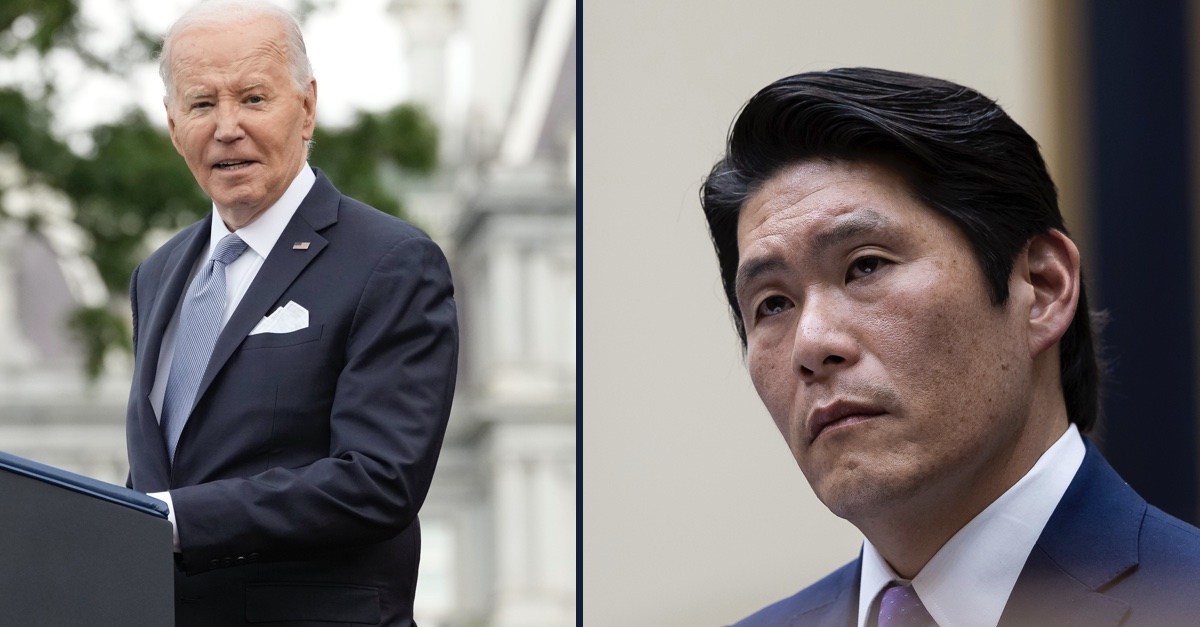
Left: President Joe Biden speaks on May 23, 2024. (AP Photo/Jacquelyn Martin). Right: special counsel Robert Hur testifies before the House Judiciary Committee on March 12, 2024 (Francis Chung/POLITICO via AP Images).
The U.S. Department of Justice on Thursday told a federal judge that combined efforts by two conservative groups and a coalition of mainstream media organizations to obtain “properly withheld” audiotapes of President Joe Biden’s interview with special counsel Robert Hur through a Freedom of Information Act (FOIA) lawsuit should fail for numerous reasons, including that the threat of “deepfakes” and “privacy harms” to an uncharged individual are real and that forcing disclosure “would create a perverse incentive” against executive branch cooperation with Congress.
On the one hand, DOJ disputed that there is “any meaningful countervailing public benefit” to disclose the recordings given that a transcript of the interview was released and Hur testified before Congress about his report and non-charging recommendation for willful retainment and disclosure of “classified materials,” but on the other hand DOJ acknowledged that the the audiotapes contain “new information not contained in the written transcript,” namely the “sound, tone, and pacing” of Biden’s answers (i.e., the “non-lexical aspects” of the tapes).
DOJ is asking U.S. District Judge Timothy Kelly, a Donald Trump appointee, to grant summary judgment against the Heritage Foundation, Judicial Watch, and a media coalition, composed of CNN, ABC, The Associated Press, CBS News, The Wall Street Journal, NBC, Reuters, and others, by arguing that Biden’s “privacy interests” outweigh the “public interest” in releasing the tapes under FOIA.
Here are some of the DOJ’s main arguments.
The audiotapes of the five-hour Biden interview with Hur was “properly withheld pursuant to multiple statutory exemptions,” in part, because releasing the tapes would interfere with “pending” law enforcement investigations.
There is no basis under the Freedom of Information Act to require disclosure of the audio recording of Special Counsel Hur’s interview of President Biden. As established in the Department’s opening memorandum, the audio recording was properly withheld pursuant to multiple statutory exemptions. Because the audio recording is subject to the President’s formal assertion of executive privilege, it is covered by a recognized litigation privilege and consequently is exempt under Exemption 5. It is also exempt under Exemptions 6 and 7(C) because of the unwarranted privacy harms that would result from disclosure without any meaningful countervailing public benefit, particularly because a written transcript of the audio recording has already been publicly released. Finally, the audio recording is properly withheld under Exemption 7(A) because its disclosure would risk unjustifiable interference with law enforcement efforts, both in pending investigations and reasonably anticipated future investigations.
Threat of “deepfakes” is not hypothetical.
Plaintiffs, DOJ said, “cannot rebut that the specific privacy harms identified by the government are plausible and significant (as evidenced by a recent deepfake purporting to be the very audio recording at issue in this case).”
The DOJ said that even though there has been no release of the audio, the department has already had to debunk a TikTok video claiming to be the real deal.
DOJ claimed that releasing the tapes would be akin to a Pandora’s Box scenario that would only tend to create chaos and threaten Biden’s privacy interests.
“Notwithstanding Plaintiffs’ attempts to downplay these new threats to privacy, they cannot alter the fact that modern technology would substantially exacerbate the reasonably expected harm to privacy that would result from the disclosure of the audio recording,” the filing said, adding a couple paragraphs later: “Furthermore, by withholding the recording, the government makes it easier to counteract any deepfakes as they arise.”
“With the audio recording withheld from disclosure, if any audio file surfaces purporting to be a copy of President Biden’s interview, it is easier to promptly confirm it is a deepfake and to issue a statement denying its authenticity and reiterating that the true copy has never left the government’s custody,” the DOJ asserted, pointing to the TikTok video debunking.
If the tapes were released, “it would be substantially harder to identify, track, and counteract the manipulated versions.”
“Withholding of the audio recording is plainly justified by the text of the FOIA,” and overriding Biden’s executive privilege assertion without a “demonstrated need” would raise “grave constitutional concerns.”
The basis of the privilege claim in this case is that the President of the United States personally asserted executive privilege over the very record at issue. And he did so after the Department’s Office of Legal Counsel as well as the Attorney General concluded that these records were subject to a lawful claim of executive privilege given the harm that would result from their disclosure.
If it were something of legal no-brainer that these tapes were “presumptively available to the public under the FOIA, without any showing of need,” DOJ asked, then why did House Republicans separately sue to enforce a subpoena?
Indeed, Plaintiffs’ interpretation would lead to the absurd result that an individual member of Congress could file a FOIA request for a record subject to an assertion of executive privilege, and that record would be presumptively available under the FOIA (without a showing of need), even though if a congressional Committee sought the same record pursuant to Congress’ Article I oversight authority, it would need to meet a heightened standard of need to overcome the assertion of executive privilege.
[…]
Such a result would be particularly surprising to discover hiding in a statute that has existed for decades. Indeed, if such a result were correct, it is hard to see why the House Judiciary Committee would have felt it necessary to file a lawsuit to enforce a subpoena for the audio recording, at it recently did before another Court in this District. See Compl., ECF No. 1, Jud. Comm. of the House of Reps. v. Garland, No. 1:24-cv-1911 (D.D.C. July 1, 2024).
The plaintiffs have “cramped” ahistorical, constitutionally baseless views of executive privilege.
Indeed, Presidents have invoked their authority to protect the confidentiality of investigative files for almost two centuries based on many of the same concerns that motivated the President to act here. This invocation is as “traditional” as any to which Plaintiffs’ point.
Rather, executive privilege is available for the President to assert when necessary to effectively carry out his or her Article II duties, and when nondisclosure of confidential Executive Branch information is in the public interest.
Releasing the tapes through FOIA to “second-guess” Hur’s non-charging recommendation and the special counsel’s characterizations of Biden as a “sympathetic, well-meaning, elderly man with a poor memory” would only promote non-cooperation in investigations of this magnitude.
Plaintiffs’ claim that disclosure of the audio recording is appropriate to help the public in evaluating the Special Counsel’s declination decision also proves too much. It is likely true in many cases that specific pieces of evidence play a role in a prosecutor’s decision to decline charges, but that does not mean there is a public entitlement to hold such evidence up to public scrutiny in a bid to second-guess the prosecutor’s decision, regardless of the privacy interests at stake. Such a result would eviscerate the well-established principle that the privacy rights of uncharged individuals are among the most protected under FOIA.
[…]
Indeed, a reason the public already has such a high volume of information about Mr. Hur’s investigation and decision-making is because of the extraordinary cooperation of the Department with Congress, consistent with the constitutionally mandated accommodation process. If such cooperation rendered the Executive Branch unable to protect remaining information, or rendered the President unable to effectively assert executive privilege to prevent disclosure, that would create a perverse incentive against cooperation that could undermine Congress’s ability to access information and heighten conflict between the branches.
Read the DOJ’s response to the Heritage Foundation, Judicial Watch, and the media coalition here.
Have a tip we should know? [email protected]

